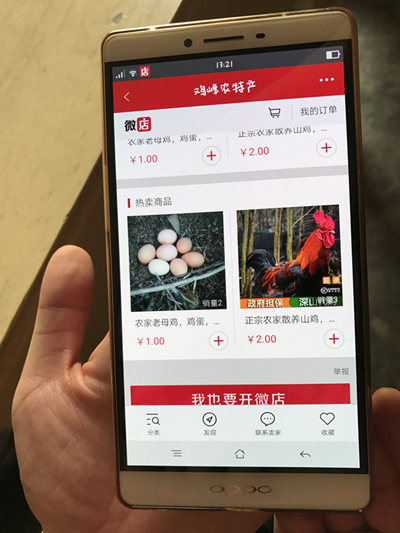E-commerce: Changing the landscape of rural poverty
GPIG by Zhang Ling, November 2, 2016 Adjust font size:
Online seller shows how to buy via WeChat. [GPIG/Photo by Jiao Meng]
Buying Online
In April 2015, Cheng County set up its own Taobao (an Internet distribution website launched by China's e-commerce giant Alibaba) rural service center to help rural citizens shop and do business online.
The center also serves as a platform for distribution, supply chain optimization, quality inspection as well as employee training , aiming at cutting the living expenses of local citizens and improving their economic performances.
"In addition, the center also employs locals as its partners and increases their off-farm opportunities. These partners are trained and sustained financially and technically; they are also tasked with helping villagers, most of whom know little about online shopping, to make purchases on the Internet," said Tang Zhongqiang, Alibaba's regional manager of Taobao Villages.
According to the local center, villagers pay after receiving goods and can also return goods back if they are not satisfied with their purchase. If people buy large equipment, the center’s partners can also help with installation and provide post-sale services. Moreover, locals can also pay phone and utility bills at the center’s location.
"My neighbor Chen Huaimin, a 60-year-old online shopper, can't help buying daily supplies via the Internet. It is because he enjoyed good service when buying a leather jacket online last April," pointed out Chen Yanping, also a villager from Cheng County.
In the case of another villager Chen Xiangxiang, Taobao Village helped her save money and energy in buying large electric appliances like a refrigerator, oven, washer and air-conditioner when renovating and decorating her house.
"For example, a Haier three-door refrigerator might be sold for 2,680 yuan (U.S $398) in stores, but only costs 1,299 yuan (U.S. $193) online. Chen Xiangxiang can save 1,381 yuan (U.S $204) through e-commerce," introduced Chen Yanping.
"In the past, deliveries could only reach counties and towns, but now they can reach villages directly. The center is introducing locals to online shopping for the first time. It also pushed logistics platforms to reach villages at the grass-root level and occupy rural markets," indicated a partner working for the Taobao Village.
Tang Zhongqiang of Alibaba said helping locals make purchases on Taobao can also help improve e-commerce-related knowledge among rural people, and it's expected that in the future rural online buyers, or at least some of them, will become online sellers.
Up to now, a total of 40 rural service centers has been established in about 15 towns in Cheng County. Their sales volume now stands at more than 8.55 million (U.S.$ 128), accounting for 77,000 transactions.
